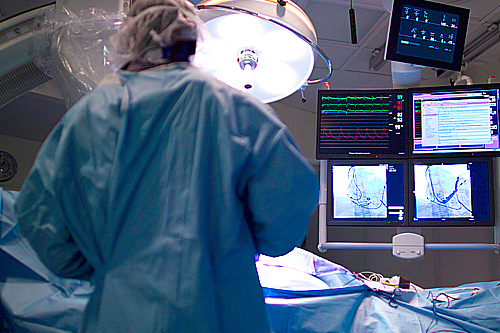Header Two
Invasive Cardiovascular Technology
Invasive Cardiovascular Program Associates Degree.
The Associates Degree Program will not be accepting students for the Fall 2026 class.

A career as an Invasive Cardiovascular Technologist is a compelling and rewarding choice that seamlessly merges cutting-edge technology with compassionate patient care.
From assisting cardiologists in life-saving procedures to operating state-of-the-art imaging equipment, this profession provides a platform for individuals to immerse themselves in the forefront of cardiovascular technology while honing their clinical skills and critical thinking abilities.
Need more information?
This profession offers a unique blend of intellectual challenge, hands-on skill development and the opportunity to make a profound impact on the lives of individuals confronting heart disease.
The School of Allied Health offers two pathways to become an Invasive Cardiovascular Technologist:
- Associate Degree Pathway: Students can enroll in the Associate Degree program, and upon completing the prerequisite courses, they may apply to the Cardiovascular Program.
- Post-Associate Certificate Pathway: Graduates holding an Associate Degree in Radiologic Technology and a valid radiography license can apply directly to the Cardiovascular Program.
Note: Applicants with a Bachelor's Degree are encouraged to contact the School of Allied Health Admissions Office for a transcript evaluation. In many cases, individuals with a Bachelor's Degree are eligible to apply directly to the program.
Ready to apply?
Certification
Graduates of the Cardiovascular Technology Program are eligible for the Invasive Registry Exam to become a Registered Cardiovascular Invasive Specialist (RCIS) through the Cardiovascular Credentialing International, Inc. (CCI).
What Is Invasive Cardiovascular Technology?
- A healthcare professional who assists cardiologist with locating and opening blockages in arteries in the heart and throughout the body, preventing or stopping heart attacks, and improving quality of life by restoring normal blood flow.
- Within the Cath Lab, Invasive Cardiovascular Technologists work closely alongside cardiologists, nurses, anesthesiologists and support staff to orchestrate complex procedures with precision, efficiency and compassion. As a member of the cardiac catheterization team, the Invasive Cardiovascular Technologist’s primary responsibilities include
- Preparing and sterilizing equipment used in cardiac catheterization procedures.
- Assisting in positioning the patient for the procedure and ensuring their safety and comfort throughout.
- Monitoring the patient’s vital signs.
- Operating imaging equipment to help guide catheters to the heart and visualize blood vessels.
- Collecting and analyzing data during the procedure to assist the cardiologist.
- Collaborating closely with the healthcare team to ensure the proper and safe conduct of the procedure.
- The role of an Invasive Cardiovascular Technologist is not merely a job—it is calling, a vocation grounded in compassion, driven by expertise and defined by the enduring legacy of changing lives one heartbeat at a time.
Associate Degree Program Features and Objectives
- Learning objectives and outcomes:
- Apply foundational theory and principles of Invasive cardiovascular technology in the clinical environment.
- Perform in the roles of scrub, circulate, and monitor during cardiovascular diagnostic and therapeutic services.
- Demonstrate competency in defining and assessing anatomy, pathology and physiology associated with the cardiovascular system.
- Assist cardiologists with the performance of cardiac catheterizations and evaluation of hemodynamics.
- The duration of this program is 16 months.
Post Associate Degree Program Features and Objectives
- Learning objectives and outcomes:
- Apply foundational theory and principles of Invasive cardiovascular technology in the clinical environment.
- Perform in the roles of scrub, circulate, and monitor during cardiovascular diagnostic and therapeutic services.
- Demonstrate competency in defining and assessing anatomy, pathology and physiology associated with the cardiovascular system.
- Assist cardiologists with the performance of cardiac catheterizations and evaluation of hemodynamics.
- The duration of this program is 12 months.
Program Mission Statement
The program’s mission is to nurture and cultivate the next generation of skilled cardiovascular technologists. We strive to provide a supportive and engaging learning environment that includes hybrid classes and in-hospital labs and clinical rotations. Our program is built on ethical practice, technological proficiency and compassionate patient care. We ensure that our graduates will be prepared to make meaningful contributions to the healthcare industry.
Program Catalog Page
Learn more about this program in the College Catalog:
Official Invasive Cardiovascular Technology, A.A.S. Program Description in the Course Catalog
Official Invasive Cardiovascular Technology, P.A.C. Program Description in the Course Catalog
